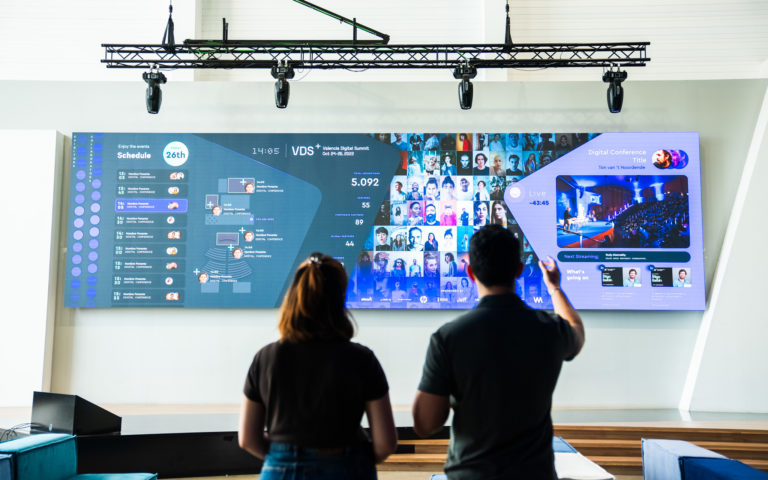Weaving alliances, weaving opportunities

Global interconnectivity is a feature of the current era that offers us a great panorama of challenges and opportunities for development. The possibility of shortening distances and establishing links on the other side of the world is no longer just a faculty of large corporations, but an opportunity increasingly addressed by companies of all sizes and sectors.
Digital transformation and intelligent data processing have opened the doors to new horizons through the integration of new tools such as information storage in the cloud, data analytics, artificial intelligence, the Internet of Things (IoT), teleworking and remote collaboration or online sales platforms (E-commerce). These tools, in addition to modernizing operations, automating processes, reducing the manual workload, minimizing human error and streamlining daily tasks, have cleared the field of difficulties and fears that were holding back progress into new territories.
Building international business networks is of great importance in an increasingly globalized and connected world. These networks involve collaboration and interaction between companies from different sectors for the development of a new, more informed, creative and resilient business culture.
During the month of August we have had the opportunity to visit the wonderful Mexican lands and inquire about the concerns that emerge in the management circles of some leading organizations.
Permeability and alliances
The ability to adapt to change allows us to position ourselves in the marketplace; and intelligent synergies with companies that help us leverage our strengths, as well as technology partners that can advise us on innovation and enhance our skills, promise significant benefits; enriching perspectives and opportunities within the global landscape.
Some inputs to take into account are:
- Access to new markets: expanding reach beyond local markets. Access new audiences, increase growth opportunities and generate new sources of revenue.
- Risk diversification: By operating on several continents, companies can diversify their risks. If one region faces economic, political or other challenges, operations in other parts of the world can help mitigate the negative impact.
- Access to global resources: By collaborating with companies in different parts of the world, you can access a variety of resources, such as skilled human talent, unique raw materials, advanced technologies and expertise that can be difficult to find in one place.
- Innovation and learning: Exposure to different business cultures and approaches fosters innovation and learning. Collaboration with companies from other continents leads to new ideas, approaches and solutions that might not otherwise have been considered.
- Acquiring market knowledge: Intercontinental networks enable companies to gain in-depth knowledge of local markets in different parts of the world. This is crucial for tailoring products and services to the specific needs of each market.
- Strengthening the global brand: Participation in intercontinental business networks can contribute to strengthening a company’s global brand. By being recognized on multiple continents, the company can gain greater international reputation and credibility.
Challenges and requirements
It is also important to take into account the challenges associated with building intercontinental business networks, such as cultural differences, trade regulations, time differences and language barriers. Effectively managing these challenges requires careful planning, transparent communication and flexibility in business strategies.
We believe that data and people have the capacity to change the world, to reinvent a more fertile and fertile universe of exchange with renewed values and in pursuit of a more sustainable future.
Some of the most relevant points to keep in mind about an intelligent and profitable use of data to enhance business development in the digital era are:
- The importance of effective data management: Knowing how to choose which data we are interested in knowing and which we are not, choosing correctly each of our KPIs and KRIs, and differentiating between vanity and actionable metrics. The indicators are the ones that give value to the data, allowing us to understand the information in context and use it for decision making. In the article “The value behind the data” we develop a little more on this topic.
- Unification of information sources: Organizations work on a daily basis with different data sources, specific software for accounting, HR, SSR, sales platforms; this leads us to have a lack of cross-departmental view of our business and, therefore, poor data tracking. Integrating data from each of these sources and dumping them in dashboards helps us to unify all this information in one place, saving analysis time and increasing interdepartmental communication.
- Information distribution and intelligent communication: through a clear, correlated and integrative presentation, it is possible for information to reach all members of the chain and not just the general management is a necessity. It is essential to communicate data to all team members, promoting their empowerment for more agile and effective decision making.
- Intuitive and clear designs: The design of the dashboards should allow to capture at a glance the general situation of the company, identifying business opportunities and anticipating deviations, detecting patterns and trends. At Zeus we attach great importance to the easy legibility of the information, using design and communication strategies. The panels are presented with a pleasant appearance to the eye; following the idea of Storytelling; allowing access to information in an intuitive and enjoyable way. In the article “The paint and color of Big data” you can learn about the importance of creating a design that arouses emotions in the teams.
- Artificial Intelligence: The possibilities for the application of AI are endless, but there is no doubt that these new tools will allow us to save time and effort in repetitive tasks, focusing our efforts on those tasks that generate value for our customers. The incorporation of these technologies allows us to optimize management so that people can focus on tasks that generate a value contribution and require sensitivity and empathy; being able to stop worrying about activities that can be automated.
At Zeus we help companies turn data into business; into value for companies. The possibility of understanding global concerns enriches and motivates us.
Globalization allows us to approach changes and transformations as opportunities for expansion, taking advantage of tools and being permeable to changes will be the characteristics that allow us to remain competitive and expanding.
As our COO, Amparo García, mentions:
“In a world where the future is constantly advancing, data becomes the light that guides organizations to sustainable success in the digital age; and synergies, collaborations and networks promise a more prosperous and connected future.”



